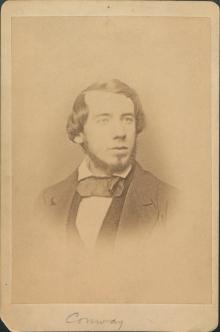- Home
- Archival Material
- College History Projects
- Subject-Based Digital Projects
Moncure Daniel Conway (1832-1907)

Moncure Daniel Conway, the second son of a distinguished family from Stafford County, Virginia, was born on March 17, 1832. His father, Walker Peyton Conway, was a prominent slaveholding landowner, a magistrate, and a representative to the Virginia legislature. His mother, Margaret Daniel Conway, could trace her family to the earliest days of the commonwealth. Both his parents had converted to Methodism, he from the Episcopalians and she from the Presbyterians, and the Conway children were exposed at an early age to evangelicalism. Moncure Conway first went to a family school and then attended the thriving Fredericksburg Classical and Mathematical Academy, a school that had educated George Washington and other famous Virginians. He entered Dickinson College in Carlisle, Pennsylvania as a sophomore at the age of fifteen. Conway advanced quickly at the Methodist affiliated college and graduated with the class of 1849. While there he had begun his career as a writer, founding the College's first student publication, fell somewhat under the influence of Professor John McClintock, and had also embraced the Methodist Church. After thoughts about a career in law, and despite emerging doctrinal doubts, the young graduate became a circuit-riding Methodist minister in 1851. Increasingly uncomfortable with conformity, he soon left Methodism for Unitarianism and enrolled at Harvard's Divinity School. There he met Ralph Waldo Emerson, who had provided much of the impetus of Conway's intellectual development during his undergraduate years. On the great ethical and cultural question of the day, Conway was emerging as an abolitionist. By now the young Virginia aristocrat was well on his way to the freethinking that would make him famous.
Graduating from Harvard in 1854, he first took the Unitarian pulpit in Washington, D.C. His time in the capital was not a happy one, however. In theology Conway was becoming more radical, while his views on emancipation recommended the minority opinion that disunion was preferable to civil war. An independent South would be left to work out emancipation through the moral example of the North. This opinion pleased few members of his congregation on either side of the question, and he was relieved to take up a position in Cincinnati in late 1855 having despaired of advancing abolitionism with work in the south itself. In Ohio, a far more liberal membership welcomed him and he was able to continue his development in both study and writing. He also married Ellen Dana, the daughter of Charles Dana, and together the couple formed a strengthening partnership that ended with them leaving the Unitarian Church.
Meanwhile, Conway's greatest fears were realized with the outbreak of the Civil War and the splitting of both his family and his abiding love for his home state of Virginia. Still, he accepted a mission on behalf of northern abolitionists to explain anti-slavery and the Union cause to a divided Britain. He traveled to London in April 1863 and was well received in intellectual circles, befriending another one of his early heroes, Thomas Carlyle, as well as Robert Browning. But with a personal enthusiasm that overwhelmed his limited skills as a diplomat, he precipitously offered the Confederate representative in Britain, James Murray Mason, the full opposition of northern abolitionists to any further prosecution of the war in exchange for immediate emancipation of all slaves held in the Confederate states. Mason rebuffed him publicly, American abolitionism immediately disowned him, and he prudently explained himself to the United States ambassador, Charles Francis Adams, apologizing for any appearance of treason in his remarks. Feeling cut off from home, North and South, he took up an appointment at the South Place Chapel in London. The South Place Society, later the South Place Ethical Society, had been founded fifty years before on the ideals of personal virtue superceding faith or doctrine and Conway's new post gave him the opportunity to bloom as a student of religion and free thought. The more open intellectual climate of Britain also helped his exchanges of ideas with people as diverse as Swinburne, the Rossettis, and Annie Besant. Conway stayed for seventeen years, lecturing, traveling, and publishing some of his most well-known and memorable works.
When he returned to the United States in 1884 upon the death of his father, his publications had rehabilitated his reputation. This standing he enhanced with further works on Edmund Randolph, George Washington, Nathaniel Hawthorne, and Thomas Paine to the point that his increasingly conservative alma mater awarded him an honorary doctorate in 1892 and asked him to serve as a trustee. In 1892, however, he returned to London and his position at the South Place Society. This tenure was cut short five years later in tragic circumstances when he was forced to bring his ailing wife home to die in New York on Christmas Day, 1897. The devoted couple had raised three children: two sons, Eustace (1859) and Dana (1865), and a daughter, Mildred (1868), who would later marry the accomplished architect Phillip Sawyer.
With the loss of his life's companion, coupled with the imperialistic "spreadeaglism" that he saw as afflicting his country in the advent of the Spanish-American War, Conway left his homeland again. He lived the remainder of his life mostly in Paris and London, with periodic visits to lecture in the United States, writing further on Paine (including a two-volume biography), and speaking in the cause of free thought and world peace. In 1905, his friend Andrew Carnegie donated funds to Dickinson College for the construction of Conway Hall which was used as the preparatory school until 1917 and then served as a freshman residence hall. Moncure Daniel Conway died alone amidst his books and writings in his Paris apartment on November 15, 1907. He was seventy-five years old.
Date of Post:
2005
College Relationship:
Alumnus/Alumna Class Year:
Honorary Degree - Year:
1892